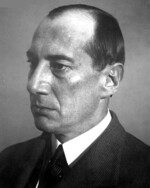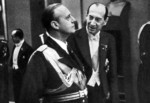Józef Beck
| Surname | Beck |
| Given Name | Józef |
| Born | 4 Oct 1894 |
| Died | 5 Jun 1944 |
| Country | Poland |
| Category | Government |
| Gender | Male |
Contributor: C. Peter Chen
ww2dbaseJózef Beck was a veteran of WW1, serving in the First Brigade of the Polish Legions as Józef Piłsudski's aide. After the war, he joined Piłsudski's Polish Military Organization, and in May 1926 helped him ascend to power. Between 1926 and 1930, he was chief of staff to the Minister of Military Affairs, and between 1930 and 1932 the Vice Prime Minister and Vice Minister of Foreign Affairs. In 1932, he became the Minister of Foreign Affairs. His international policy aimed at keeping a delicate balance between Germany and Russia, both of which were growing more powerful militarily by the day. One of his first acts as Minister of Foreign Affairs was to complete a non-aggression pact with Russia, which was signed in Jul 1932. In Jan 1934, a similar pact was signed with Germany. While being respected for his intellect and leadership skills (he still held the rank of colonel in the Polish Army), he was now being regarded as Poland's best diplomat as well.
ww2dbaseGermany's ambition, however, soon put a tilt to the balance Beck thought he could maintain. To safeguard Poland's borders, he sought a military alliance with Britain and France. To achieve it, he played every card possible to convince diplomats from Britain and France that Poland wielded a powerful military that could counter any aggression eastward by Germany. William Manchester described Beck's darker side with words such as "duplicity" and "dishonesty". Even some who knew him socially distrusted him. Mafalda Maria Elisabetta, Princess of Piedmont and daughter of Italian King Vittorio Emanuele III, though Beck was "the sort of face you might see in a French newspaper as that of a ravisher of little girls", and Galeazzo Ciano thought him as an "unsympathetic character who produces a chill around him." Regardless of such unfavorable opinions from many, however, his diplomatic abilities convinced Britain and France to enter a military alliance with Poland in the spring of 1939. He did not expect, however, this alliance that was supposed to deter German aggression actually gave Adolf Hitler the excuse to tear up the German-Polish non-aggression pact on the grounds of a Polish conspiracy against Germany. Of course, his stern objection against German wish to annex the Free City of Danzig and the German request to build a roadway to East Prussia across Poland had both degraded German-Polish relations as well before Hitler tore up the non-aggression pact. A known pursuer of pan-European peace, Beck nevertheless knew war was inevitable by this point. After meeting Winston Churchill in London in 1939, he informed Churchill that he was to take a rail car across Germany on his return trip to Poland. Concerned for Beck's safety, Churchill asked him whether he would be alright. Beck responded, "I think we shall have time for that." He was right, he had time to safely cross Germany, for Hitler would not launch his attack until Sep 1939.
ww2dbaseAfter the German invasion, Beck fled into Romania with the Polish government, and was imprisoned by Romanian authorities. After completing his memoirs titled Ostani raport, he died in captivity in Stanesti, Romania.
ww2dbaseSources: the Last Lion, Wikipedia.
Last Major Revision: Jun 2006
Photographs
 |  |
Józef Beck Timeline
| 4 Oct 1894 | Józef Beck was born. |
| 5 Jun 1944 | Józef Beck passed away. |
Please consider supporting us on Patreon. Even $1 per month will go a long way! Thank you. Please help us spread the word: Stay updated with WW2DB: |

» No. 15: Speech made by M. Beck, the Polish Minister for Foreign Affairs in Parliament
- » 1,182 biographies
- » 337 events
- » 45,131 timeline entries
- » 1,249 ships
- » 350 aircraft models
- » 207 vehicle models
- » 376 weapon models
- » 123 historical documents
- » 261 facilities
- » 471 book reviews
- » 28,435 photos
- » 365 maps
Lt. Gen. Lewis B. "Chesty" Puller, at Guadalcanal